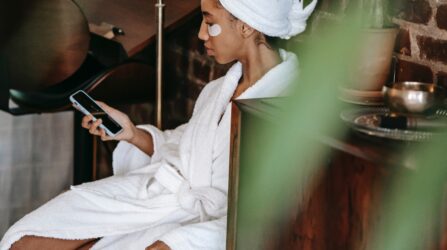
Oxytocin: ‘The Love Hormone’, increases feelings of trust, intimacy and contentment. Lowers the level of Cortisol, so we feel more relaxed and lower our chances of heart disease. Higher levels of oxytocin also help to decrease feelings of anger and loneliness.
Serotonin: Neurotransmitter associated with depression, when our levels of serotonin rise, our moods and sleep cycles improve. Serotonin has also been linked to supporting our immune systems.
Dopamine: Regulates emotional response, low levels of dopamine are common with people struggling with depression.
These three hormones play key roles in regulating our emotions, improving our relationships and generally supporting our mental health. Low levels of them have been linked to stress, anxiety and depression. Luckily, these hormones are easy to trigger:
‘A hug a day keeps the demons at bay’ – German Proverb
Think back to when you were a child; when you fell of your bike and scuffed your knee, when you lost your favourite toy or had a bad day at school, how many of us ran straight into the arms of our loved ones? The undeniable truth that no matter what was wrong with you or the world, a hug from your mum, from your grandmother or your dad, somehow, made everything right again. Made you dry your eyes and sniff your snot back and somehow brought a smile onto your face.
The feeling of being nurtured, cared for and safe, alongside increased feelings of intimacy and the awareness of being in trusted company, are key to relieving stress and making our moods better. This isn’t just mum magic of miraculously making everything better, many studies have been linked to physical signs of affection and improving our mental and physical health.
It’s a lot of power for such a simple, everyday action; something anyone and everyone can do.
So well supported and recognised is this fact, that you can go to hugging therapists, certified cuddles, to add a holistic approach to your mental wellbeing. Like with a counsellor or therapist, you make an appointment and go along to work on any problems you are facing, just with more hugging.
Now, as a born and raised English girl with a ingrained resistance to displays of affection, especially with strangers, the idea seems ridiculous, I’m sure there are people out there laughing at the thought; but the power of hugging has also been linked to improving our immune systems, muscle relaxation, relieve pain and balance the nervous system. And really, it makes you feel good, so its hardly a waste of time.
I for one like to hug my sister, I put her in a headlock its how I show her affection. Which is good, because hugging people increases our empathy and physical affection is key to developing strong and trusting relationships between friends, family and romances.
It’s easy, loving and comes without a second thought that when you see someone you love, you hug them. When someone you care for is having a hard time, you hug them. It’s a quick way to relieve stress and tension when someone gets home after a rotten day at work.
Make a little more effort to hold your loved ones near, Darlings, for their benefit, and yours.
Just maybe without the headlock, apparently, it’s somewhat annoying.

-


Dr Singh is the Medical Director of the Indiana Sleep Center. His research and clinical practice focuses on the myriad of sleep.

Understanding PMS symptoms without menstruation Before we proceed with explanations, we wanted to clarify why having PMS symptoms is not the same as being diagnosed with PMS. As we’ve already mentioned, PMS stands for premenstrual syndrome. This syndrome is diagnosed

Understanding PMS vs. pregnancy symptoms Before we proceed, please keep in mind that during a normal menstrual cycle, you may experience symptoms; however, they should be mild and not interfere with your daily life. This is a common and normal

The importance of the follicular phase While it may not be the most fun part of the menstrual cycle, the follicular phase plays a key role in your reproductive health. As we mentioned, the follicular phase begins on the first
Privacy Overview
| Cookie | Duration | Description |
|---|---|---|
| cookielawinfo-checkbox-analytics | 11 months | This cookie is set by GDPR Cookie Consent plugin. The cookie is used to store the user consent for the cookies in the category "Analytics". |
| cookielawinfo-checkbox-functional | 11 months | The cookie is set by GDPR cookie consent to record the user consent for the cookies in the category "Functional". |
| cookielawinfo-checkbox-necessary | 11 months | This cookie is set by GDPR Cookie Consent plugin. The cookies is used to store the user consent for the cookies in the category "Necessary". |
| cookielawinfo-checkbox-others | 11 months | This cookie is set by GDPR Cookie Consent plugin. The cookie is used to store the user consent for the cookies in the category "Other. |
| cookielawinfo-checkbox-performance | 11 months | This cookie is set by GDPR Cookie Consent plugin. The cookie is used to store the user consent for the cookies in the category "Performance". |
| viewed_cookie_policy | 11 months | The cookie is set by the GDPR Cookie Consent plugin and is used to store whether or not user has consented to the use of cookies. It does not store any personal data. |
